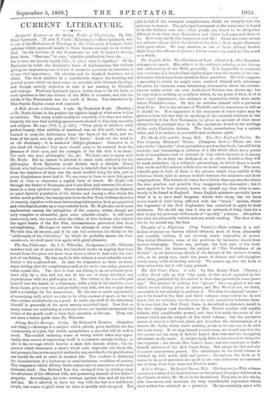A Ride Across a Continent. 2 vols. By Frederick Boyle.
(Bentley.) —Mr. Boyle claims in his preface the right to laugh at what seem to him absurdities. The claim would readily be conceded, if it were not unfor- tunately the case that nothing appears more absurd to him than morality and religion. Ile says (Vol. I., p. 151), "What glory of intellect, what perfect beauty, what nobility of manhood was on this earth before we learned to pray for deliverance from the lusts of the flesh, and the lusts of the eyes, and the pride of life!' Lusts ! Look out the word in an old dictionary ; it is rendered delight-pleasure.' Conceive it, 0 you dead old Greeks ! that men should pray to be excused from the pleasure of their eyes, and the strength of the life that is in them ! Not such was your philosophy," &c., &c. We don't care to argue with Mr. Boyle. But he cannot be allowed to claim such authority for his philosophy. Even Epicurus would disdain such a disciple. Every Greek who had any nobleness or wisdom in him felt that to be delivered from the dominion of lusts was the most needful thing for him, just as every Englishman must feel it. We are sorry to have to note this grave fault in what is otherwise a capital book of travel. Mr. Boyle rode through the States of Nicaragua and Costa Rica, and narrates his adven- tures in a very spirited style. Smart sketches of life among the Spanish or quasi-Spanish population of the States, and among a class whom the writer much prefers, the immigrants from the Far West, brilliant sketches of scenery, together with most interesting information, both geographical and ethnological, make up a very readable book. Mr. Boyle also made some explorations among the antiquities of the country, which, though not very complete or successful, gave some valuable results. A still more interesting task, the search after the tribes of free Indians who inhabit the upper banks of the Rio Frio, circumstances prevented him from accomplishing. He hopes to renew the attempt at some future time. We wish him all success, and if he can but overcome his dislike to the "philosophy of the Catechism," by which he probably means the Co»t- mandments, we shall meet him again with great pleasure.






























 Previous page
Previous page